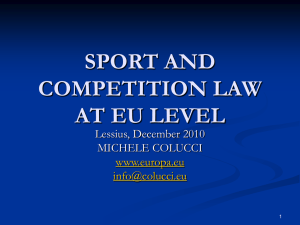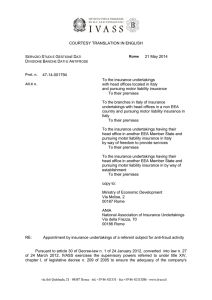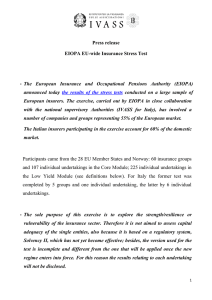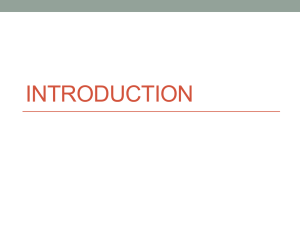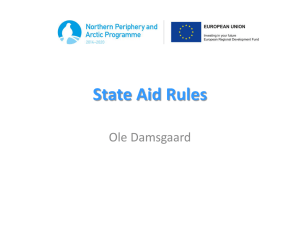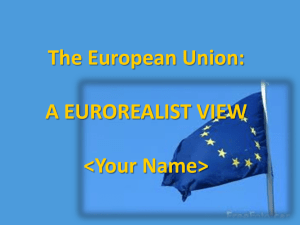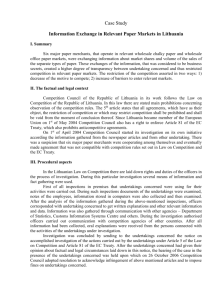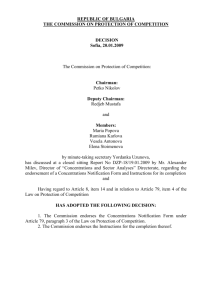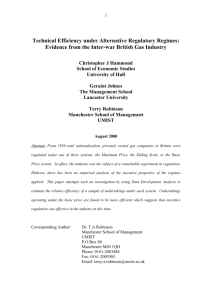STATE AID AND ENVIRONMENTAL PROTECTION
advertisement
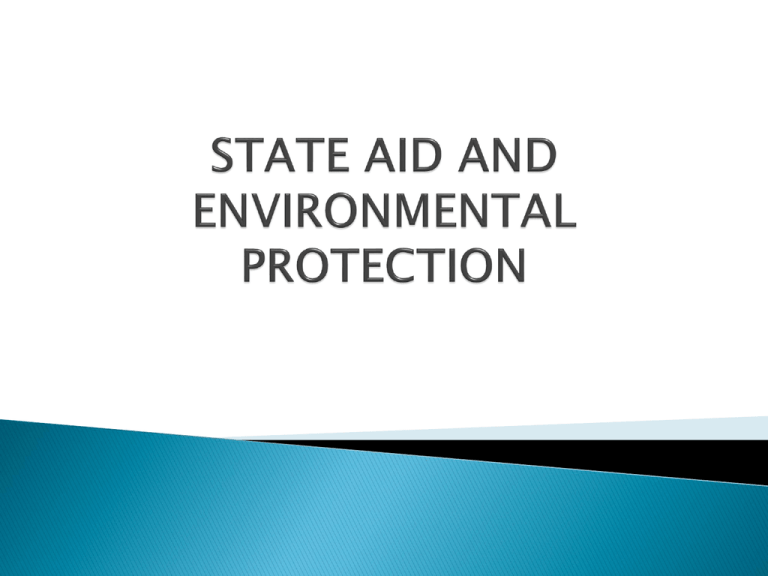
Part I: ◦ ◦ ◦ ◦ Consider the notion of economic constitution; Place competition regulation in context; Evaluate the space that is filled by State aid; Understand the structure of the rules. Part II: ◦ How are other EU policies integrated into State aid rules; ◦ What role does environmental protection play; ◦ Case law on environmental protection and state aid. What is an economic constitution? As early as in the 19th century the term ‘economic constitution’ could be found in the scholars’ works. However, it wasn’t accepted widely until the mid of 20th century and was put into practice for the first time in the constitution of the Republic of Weimar. Generally, it refers to the “sum of the laws and institutional arrangements regulating economic activities”. Fikentscher pointed out that “the economic constitution, in a cotemporary sense, is constituted by the sum of constitutional and other fundamental legal provisions ……which regulate the fundamental relationships of the economy, the state and its citizens.” Linck, the economic constitution is “the fundamental legal rules and constitutional norms pursuant to which the state defines the scope of economic freedoms, conducts monitoring or economic regulations.” Since the inception of the European Coal and Steel Community through the numerous treaty revisions and enlargement to 28 Member States, the constant for the EU has been economic integration. The economic area and integration is also the most developed part of EU integration, which has been reflected by the centrality of the internal market. EU is often described as a “market without a state”. “when a treaty of economic integration includes a certain degree of positive integration, people can regard it as some kind of economic constitution” Does the EU have an economic constitution? REGULATING THE INTERNAL MARKET/PROTECTING THE EU ECONOMIC CONSTITUTION FREE MOVEMENT RULES Competition Provisions EU ECONOMIC CONSTITUTION Tax Provisions Customs Union Competition Merger Control State Aid To prevent cartels and other Restrictive agreements in the market. To prevent mergers and acquisitions that reduce competition in the market To limit distortions of competition and trade resulting from state subsidies to firms; state aid can be permitted when is in line with the common (EU) interest. To prevent abuses of dominant market positions Public intervention in the economy is a common feature in modern States and may take several forms, pursue different objectives and have different effects. Some measures adopted by the State aim generally at favouring its business sector and may make demands on the public purse. EXAMPLES OF STATE AID State grants; interest rate relief; tax relief; tax credits; State guarantees or holdings; State provision of goods or services on preferential terms; direct subsidies; tax exemptions; preferential interest rates; guarantees of loans on especially favourable terms; acquisition of land or buildings either gratuitously or on favourable terms; provision of goods and services on preferential terms; indemnities against operating losses; reimbursement of costs in the event of success; State guarantees, whether direct or indirect, to credit operations preferential re-discount rates; dividend guarantees; preferential public ordering; reduction of, or exemption from, charges or taxes, including accelerated depreciation and the reduction of social contributions; deferred collection of fiscal or social contributions; assistance financed by special levies; capital transfers; certain State holdings in the capital of undertakings. consultancy advice; advantages resulting from the activities of agencies for urban renewal; assistance to help companies invest in environmental projects; assistance to help a public enterprise prepare for privatisation; legislation to protect or guarantee market share; public private partnerships and contracts not open to competitive tendering; Receipt of landfill tax credit funding. free advertising on State owned television; infrastructure projects benefiting specific users. providing grants or other forms of funding (eg National Lottery funding); waiving sums due (eg taxes, social security contributions, loan interest, dividends); selling assets, goods or services at below market value; or buying assets, goods or services at above market value. State Aid & Internal Market Heightens Competition Free movement of goods Mutual Recognition Secondary legislation e.g. Directive 98/34; Regulation 1025/2012 National Objective, e.g. regeneration; national heritage; facilities. State grant; exemption; subsidy. Private companies attracted Competition between States Article 107 TFEU 107 (1) The Prohibition 107 (2) Absolute Exemptions 107 (3) Possible Exemptions Article 108 TFEU (Not discussed in detail) 108 (1) MS & Commission to monitor 108 (2) 108 (3) MS to report prior to implementing state aid Commission decision and standstill of proposed aid In order for a measure to fall within the scope of Article 107 (1) and constitute State aid, four cumulative criteria must be met: 1. the measure must involve the use of State resources; 2. the measure must confer an advantage on the beneficiary; 3. the advantage must be selective, in that it is limited to certain undertakings or the production of certain goods; 4. the measure must distort competition and affect trade between Member States. NB: This is a broad overview of the operation of the State aid rules. Alberto D‘Argenio, “ Sconto Ici alla Chiesa: la Ue processa l’Italia ” , La Repubblica, 24 September 2010. “The tax exemptions granted to the Church from the Italian State have led to an official EU investigation of state aid incompatible with competition rules. After four years of exchanging information, two dismissals (of the court case) and a number of counterclaims, Brussels is putting in motion a “thorough investigation” of the tax privileges granted to the ecclesiastical authorities in areas where “the Church corporation” (it owns about 100,000 buildings) is a national leader: hospitals, private schools, hotels and other commercial facilities that enjoy total exemption from payment of local municipal property tax (ICI) and 50% exemption on corporate tax (IRES). [This gives the Church] annual savings of close to two billion euros and thus competitive advantages over secular competitors.” A key distinction between State aid and the rest of competition policy is that, while State aid is in principle prohibited under Article 107(1)), 107(2) and 107 (3) reflect recognition that markets may not always work properly left alone and may need some intervention from the State to work more effectively. The Treaty expressly provides for certain noneconomic reasons – which have been interpreted to include environmental reasons - to constitute legitimate justifications for the grant of State aid. Non economic in 107 (2) and (3) FREE MOVEMENT RULES Competition Provisions EU ECONOMIC CONSTITUTION Tax Provisions Customs Union Art. 3(3) TEU: “The Union shall establish an internal market. It shall work for the sustainable development of Europe based on balanced economic growth and price stability, a highly competitive social market economy, aiming at full employment and social progress, and a high level of protection and improvement of the quality of the environment. Art.11TFEU:“Environmental protection requirements must be integrated into the definition and implementation of the Union’s policies and activities, in particular with a view to promoting sustainable development” The question is whether environmental considerations can or should be taken into account in assessing the compatibility of State aid with the Treaty? Guidelines on State aid for environmental protection, OJ 2008 C 82/1, points 5-14. Commission Regulation (EC) No 800/2008 (General block exemption Regulation) Regulation (EC) No 994/98 Consultation on the Community Guidelines on State aid for environmental protection and environmental support measures in the General Block Exemption Regulation (Due end 2013). (6) The primary objective of State aid control in the field of environmental protection is to ensure that State aid measures will result in a higher level of environmental protection than would occur without the aid and to ensure that the positive effects of the aid outweigh its negative effects in terms of distortions of competition, taking account of the polluter pays principle (hereafter ‘PPP’) established by Article 174 of the EC Treaty. NB: The Guidelines do not apply to some areas, for example the financing of environmental protection measures relating to air, road, railway, inland waterway and maritime transport infrastructure SECTION 4 - Aid for environmental protection - Article 17 "environmental protection" means any action designed to remedy or prevent damage to physical surroundings or natural resources by the beneficiary’s own activities, to reduce risk of such damage or to lead to a more efficient use of natural resources, including energy-saving measures and the use of renewable sources of energy; Article 18 Investment aid enabling undertakings to go beyond Community standards for environmental protection or increase the level of environmental protection in the absence of Community standards. Investment aid enabling undertakings to go beyond Community standards for environmental protection or increase the level of environmental protection in the absence of Community standards shall be compatible with the common market within the meaning of Article [107](3) of the Treaty and shall be exempt from the notification requirement of Article [108] (3) of the Treaty, provided that the conditions laid down in …this Article are fulfilled. Article 1- empowers the Commission to declare, in accordance with Article 107 …that, aid in favour of…environmental protection, … is compatible with the common market and not subject to the notification requirement of Article 108 (3). Commission approves €20.5 million of aid to Renault for the development of diesel hybrid commercial vehicles – The European Commission has decided that the aid granted by France to the motor vehicle manufacturer Renault to help it conduct a research and development programme complies with the EU rules on State aid. The aim of the project is to develop a diesel hybrid technology for vans. At the end of the project, Renault will equip the Trafic and Master ranges with a new hybrid engine. The diesel consumption and CO2 emissions for these two models will be reduced considerably. The Commission concluded that the State aid addresses a genuine market failure without giving rise to an undue distortion of competition; it provides both necessary and sufficient spur to Renault to carry out an R&D project it would not otherwise have launched of its own volition. The United Kingdom notified the exemption from Climate Change Levy (CCL) charged to suppliers of electricity produced from Coal Mine Methane (CMM) from abandoned coal-mines. CMM is a potent greenhouse gas, currently venting into the atmosphere. At present, there are four CMM extraction sites being utilised for electricity generation with a total generating capacity of 35 MW. The aim of the scheme is to incentivise the industry to develop further installations at about 40 further sites of abandoned coalmines, with around 175 MW added capacity. Because of the uncertainty over the exact level of the environmental benefit from the scheme, the Government intends to hold a review of the exemption in 2004/2005. Aid or Not? The measure will give an advantage to electricity generators using CMM as input, and is therefore selective. The advantage is granted through state resources as the State suffers a loss of tax revenues. The recipients exercise an economic activity on markets on which there is trade between Member States. The scheme thereby distorts or threatens to distort competition and could affect trade between Member States. The Italian authorities notified, according to Article 108(3) of the Treaty on the Functioning of the European Union (TFEU), the partial public financing for the construction of an intermodal terminal (rail-road) in the Province of Trento. The main objective of the measure is to encourage rail freight transport in the Province of Trento by means of creating an adequate rail network. The measure also aims to secure the environmental benefits associated with the transfer of lorries from road to rail. Aid or Not? As the aid is not covered by the Environmental Guidelines, it would have to be assessed directly on the basis of Article 107(3)(c) TFEU. According to constant Commission practice, an aid can be authorized on the basis of Article 107(3)(c) TFEU if it has an incentive effect, meets a clearly defined objective of common interest, is necessary and proportional to meet this objective and must not affect trade to an extent contrary to the common interest. The Commission … doubts … the assessment … on the basis of Article 107 (3)(c) TFEU. Save as otherwise provided in the Treaties, any aid granted by a Member State or through State resources in any form whatsoever which distorts or threatens to distort competition by favouring certain undertakings or the production of certain goods shall, in so far as it affects trade between Member States, be incompatible with the internal market. The following shall be compatible with the internal market: (a) aid having a social character, granted to individual consumers, provided that such aid is granted without discrimination related to the origin of the products concerned; (b) aid to make good the damage caused by natural disasters or exceptional occurrences; (c) aid granted to the economy of certain areas of the Federal Republic of Germany affected by the division of Germany, in so far as such aid is required in order to compensate for the economic disadvantages caused by that division. Five years after the entry into force of the Treaty of Lisbon, the Council, acting on a proposal from the Commission, may adopt a decision repealing this point. The following may be considered to be compatible with the internal market: (a) (b) (c) (d) (e) aid to promote the economic development of areas where the standard of living is abnormally low or where there is serious underemployment, and of the regions referred to in Article 349, in view of their structural, economic and social situation; aid to promote the execution of an important project of common European interest or to remedy a serious disturbance in the economy of a Member State; aid to facilitate the development of certain economic activities or of certain economic areas, where such aid does not adversely affect trading conditions to an extent contrary to the common interest; aid to promote culture and heritage conservation where such aid does not affect trading conditions and competition in the Union to an extent that is contrary to the common interest; such other categories of aid as may be specified by decision of the Council on a proposal from the Commission. Only advantages granted directly or indirectly through State resources are to be considered aid within the meaning of 107 (1). The distinction made in the provision between ‘aid granted by a Member State’ and aid granted ‘through State resources’ does not mean that all advantages granted by a State, whether financed through State resources or not, constitute aid but is intended merely to bring within that definition both advantages which are granted directly by the State and those granted by a public or private body designated or established by the State. The measure in question must necessarily mean that the State will incur a cost of some kind. First of all, it should be pointed out that the definition of State is very broad, covering both regional or local authorities and public authorities and public bodies, including publicly owned companies. Case C-248/84 Germany v Commission [1987] ECR 4013, para 17 No State resources involved: In Sloman Neptun, a measure enabling certain shipping undertakings flying the German flag to subject seafarers who were nationals of non-member countries to working conditions and rates of pay less favourable than those applicable to German nationals was not considered to involve State resources. In Kirsammer-Hack v Sidal, the exclusion of SMEs from the national system of protection against unfair dismissal was not considered to entail any direct or indirect transfer of State resources. State resources involved the Italian special administration procedure for large companies in difficulties. The Court considered that in view of the priority accorded to debts connected with the pursuit of economic activity, authorisation to continue trading might involve an additional burden for the public authorities; as might involve an additional burden for the State other features of the system such as the State guarantee, a reduced rate of tax, exemption from the obligation to pay fines and other pecuniary penalties or waiver in practice of public debts wholly or in part. In Ecotrade v AFS and Piaggio, the Court was asked to give guidance to the national court under Article 267 on In Ladbroke, the Court considered that the fact that certain sums were continuously subject to the State’s control, and therefore at the disposal of the competent national authorities, was sufficient for them to be categorised as State resources. It is settled case law that the concept of aid is much wider than that of subsidy because it embraces not only direct financial benefits to the undertaking but also, and more generally, any advantages granted by public authorities which, in various forms, alleviate the charges which are normally included in the budget of an undertaking. Thus, public financing of a bonus paid to workers in the coal sector was found by the Court to give an advantage to the undertakings concerned since it led to an increase in workers’ pay which artificially reduced the production costs of the undertakings.(Case 30/59 Steenkolenmijnen Limburg [1961] ECR 19) The public financing of a transitional supplement paid to the employees of an undertaking and intended to maintain their level of pay despite a reduction in their working hours was considered by the Commission and, on appeal, confirmed by the Court, to constitute an advantage to the undertaking since it alleviated the undertaking’s normal budgetary burdens. (Case C-5/01 Belgium v Commission (‘Cockerill’) [2002] ECR I11991) For a measure to constitute State aid, it must favour ‘certain undertakings or the production of certain goods’. This is the so-called ‘selectivity’ or ‘specificity’ test. Generally speaking, the State intervenes in the economy in various ways and through a series of different measures, a number of which do not favour only certain undertakings but may apply to all the undertakings of a Member State. These are general measures which do not meet the selectivity test. The fact that some undertakings may benefit more than others from a particular measure does not necessarily mean that the measure is selective. For instance, measures which aim to reduce the taxation of labour are of more benefit to undertakings in labour intensive sectors than in capital intensive sectors. This does not make them ‘State aid’. Selectivity can result from limiting the benefit of the measure to one or several sectors of activity where this is not justified by the nature or general scheme of the system. This occurs when neither the large number of eligible undertakings nor the diversity and size of the sectors to which those undertakings belong provide any grounds for concluding that a State initiative constitutes a general measure of economic policy. When the State confers even a limited advantage on an undertaking which is active in a sector where competition prevails, there is a distortion or risk of distortion of competition. The condition is therefore easily fulfilled. The concept of effect on trade is extremely broad in scope. In CETM, the Court recalled that when: aid from State resources strengthens the position of an undertaking compared with other undertakings competing in intra-Community trade, the latter must be regarded as affected by that aid … Furthermore, an aid may be of such a kind as to affect trade between Member States and distort competition even if the recipient undertaking, which is in competition with undertakings from other Member States, does not itself participate in crossborder activities. Where a Member State grants aid to an undertaking, internal supply may be maintained or increased, with the consequence that the opportunities for undertakings established in other Member States to offer their services to the market of that Member State are reduced.
